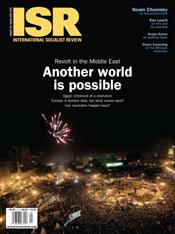A challenge to U.S. war myths

American Wars:
AMERICAN WARS: Illusions and Realities is a collection of short contributions from various antiwar activists and intellectuals, including Howard Zinn, Tod Ensign of Citizen Soldier, and Gold Star Mother for Peace Cindy Sheehan. The aim of the book, edited by Paul Buchheit, is to provide clarity for activists struggling to rebuild an antiwar movement that has suffered from significant political weaknesses since 2003.
American Wars challenges and refutes many “common sense” ideas about the history and nature of U.S. military intervention. In the opening chapter of the book, Buchheit quotes a Pentagon document from 1992 that states, “In the Middle East and Southwest Asia, our overall objective is to remain the predominant outside power in the region and preserve U.S and Western access to the region’s oil.”
While Buchheit’s editorial tone can sometimes annoy (for example, he writes, “it is understandable that today’s youth with so many entertainment options…can’t be sufficiently aware of world issues”), the book is nevertheless a useful tool for antiwar activists in the United States. The chapter by Amy Meyers, a member of Iraq Veterans Against the War, draws out the arguments for ending what Meyers refers to as the “poverty draft”—the insidious practice of targeting poor and disadvantaged youth for military service. Meyers writes:
Most military programs and/or academies are located within schools of working class communities with populations predominated by minorities. In many circumstances, it’s much easier to talk to a military recruiter than to a college advisor or an employment recruiter.
Tod Ensign, in a chapter on the mistreatment of veterans, links the issue of the Veterans Administration (VA) health system to the health-care crisis facing upwards of fifty million Americans. Ensign writes: “It is only when American society finally decides to commit the resources necessary to create a system of universal healthcare for every citizen, that our health systems, including the VA, will attain a level of care that other industrialized nations take for granted.”
The chapter by Jesu Estrada, an antiwar and labor activist from Chicago City Colleges, stands out for its timeliness as the gravest crisis of American capitalism since the 1930s has broken out alongside two failing occupations in Iraq and Afghanistan. Entitled “Illusion: War boosts the economy for all Americans,” the piece highlights how working-class people in the U.S. have been forced to foot the bill for wars fought for corporate interests and regional domination.
Estrada writes, “Shortly after the war in Iraq, homeless shelters and food pantries began to close down as states funneled funds towards the war in Iraq.” Estrada also meticulously documents several studies that chart out a trajectory of increased military spending alongside an attack on social services over the past several decades.
The Obama administration has no intention of leaving Iraq, a country that is now home to a U.S. embassy compound the size of Vatican City. The troop surge and continuing occupation of Afghanistan has destabilized Pakistan, resulting in the forced exodus of one million people from Swat Valley. Constructing a powerful antiwar movement continues to be on the order of the day. American Wars: Illusions and Realities, is a helpful resource for those involved in this project.


 Facebook
Facebook Twitter
Twitter Google+
Google+ Tumblr
Tumblr Digg
Digg Reddit
Reddit StumbleUpon
StumbleUpon
